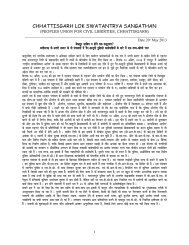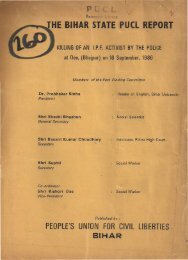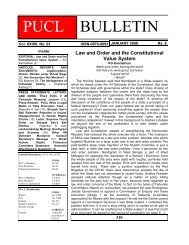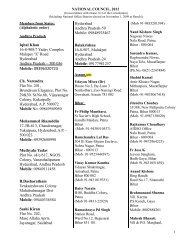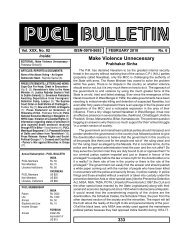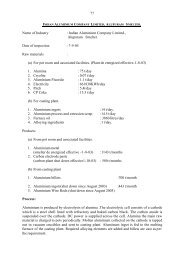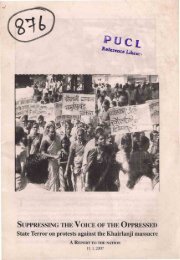Full report (pdf) - People's Union for Civil Liberties
Full report (pdf) - People's Union for Civil Liberties
Full report (pdf) - People's Union for Civil Liberties
- No tags were found...
You also want an ePaper? Increase the reach of your titles
YUMPU automatically turns print PDFs into web optimized ePapers that Google loves.
IntroductionThe series of disturbing events inChannapatna (http://www.channapatnacity.gov.in) commencedwith the arrest on 2 June 2007 of four womenunder the Immoral Traffic (Prevention) Act,1956 and the consequent media exposure andtrial of these women. When a public protestwas held to condemn the police complicity inconverting what should have been a routinejudicial process into a sensational trial bymedia, the protest was wilfully disruptedwith the protesters being beaten up in thevery presence of the police by anti–socialelements. These events constituted adisturbing pattern of state moralism andauthoritarianism wherein all democraticmeans of expressing a political opinion weresought to be stifled. Being deeply concernedabout this flagrant violation of the basicrights guaranteed in our Constitution to allcitizens, the People’s <strong>Union</strong> For <strong>Civil</strong><strong>Liberties</strong>-Karnataka (PUCL-K) constituted afact-finding team which comprisedrepresentatives from human rights groups,lawyers groups, Dalit groups, unorganizedworkers as well as health groups to enquireinto the above mentioned incidents. The factfindingteam consisted of Ramdas Rao, Salmaand Geeta from the PUCL-K (www.pucl.org),Divya Veerabhadra from Lawyers’ Collective(www.lawyerscollective.org), Yashoda fromKarnataka Dalita Mahila Vedike (KarnatakaDalit Women’s Forum), Arvind Narrain andAarti Mundkur from Alternative Law Forum(www.altlaw<strong>for</strong>um.org), Jayaram fromGarment and Textile Workers <strong>Union</strong>, andVinay from Janarogya Andholana Karnataka(People’s Health Movement, Karnataka –http://phmindia.org/states/karnataka/index.html).On 8 June 2007 the fact-finding team spoke tothe women who were arrested under theImmoral Traffic Prevention Act 1956 (ITPA),the protesters in the dharna who were beatenup, the Dy. S. P Halesh Naik and theprobationary Dy. S. P. Devraj, the SPBangalore city, representatives of civil societyorganizations in Channapatna such asSpandana (a women’s rights initiative) andKarnataka Rajya Raitha Sangha (KRRS –Karnataka State Farmers Association) inorder to determine if and how the basicrights guaranteed to all citizens have beenviolated in the case of women in sexwork.Background and ContextChannapatna is a small town located sixtykilometres from Bangalore on the Bangalore-Mysore highway. It has traditionally beenknown <strong>for</strong> its wooden lacquered toys andproducts. In terms of its social history,Channapatna’s farming communities havebeen vocal and active members of theKarnataka Rajya Raitha Sangha. It has alsohad an un<strong>for</strong>tunate history of communalskirmishes between Hindus and Muslims,which erupted in a major clash in 1990 inwhich over 18 people died.Another social concern which has emergedwithin recent years in the Channapatnacontext is the spread of HIV. Due to its beingon the highway route and having asignificant migrant and mobile population ithas emerged as a significant node <strong>for</strong> thespread of HIV. As per statistics of theNational Aids Control Organisation (NACO– http://www.nacoonline.org) in 2006 with apopulation of almost 55 million, Karnatakahas one of India’s worst AIDS epidemicswith an estimated 500,000 people orapproximately 1.7% of the adult populationliving with the disease. By comparison,India’s national HIV prevalence is 0.9% ofthe adult population. Annual SentinelSurveillance data indicates that Bangalorerural district under which Channapatna fallshas an even higher HIV prevalence rate of2.5% of the adult population.3




